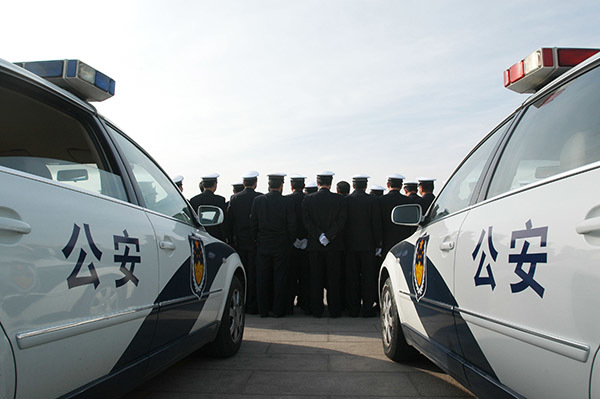Dark clouds hang over Tiananmen Square in Beijing. (Lintao Zhang/Getty Images)
[People News] A recent document issued by the Central Military Commission of the Communist Party of China is titled 'Several Regulations on Vigorously Promoting Excellent Traditions, Comprehensively Clearing the Toxic Influence, and Reshaping the Image and Authority of Political Cadres.' This comes shortly after General Miao Hua was removed from his position as a member of the Central Military Commission less than a month ago. The phrase 'comprehensively clearing the toxic influence' raises the question: whose toxic influence is being targeted?
The front page of the Chinese Communist Party's military newspaper reported on the 21st that the Central Military Commission has issued a document detailing several regulations regarding the so-called 'comprehensive clearing of toxic influences and the reshaping of the image and authority of political cadres,' which mandates that political cadres strengthen their political loyalty. These 'regulations' consist of 22 articles across 7 areas, establishing rules to enhance the so-called 'political loyalty' and 'adherence to party principles' among political cadres. It emphasises that political cadres, especially those in leadership positions, must take the lead in establishing credibility and reshaping their image and authority.
Since the 18th National Congress of the Communist Party of China, the military has faced numerous upheavals. The last time the issue of clearing toxic influences within the military was raised was a decade ago, following the downfall of former Vice Chairman of the Military Commission Xu Caihou and Guo Boxiong, with efforts to eliminate the toxic influences of Guo and Xu continuing for several years.
In 2023, the Chinese Communist Party's Rocket Force experienced significant turmoil, with the previous two defence ministers, Li Shangfu and Wei Fenghe, along with dozens of generals, being dismissed in quick succession.
Currently, He Weidong, the Vice Chairman of the Military Commission, has been missing for four months and has yet to make a public appearance. Additionally, there are rumours surrounding He Hongjun, the Executive Deputy Director of the Political Work Department of the Military Commission.
In a military that has undergone comprehensive rectification by Xi Jinping for over two years following the 20th National Congress of the Communist Party of China, the call for a thorough clearing of toxic influences raises the question: who exactly is the target of this cleansing?
The United Morning Post reports an analysis by scholars, indicating that the renewed emphasis on a comprehensive purge of toxic influences suggests the potential for significant collusion cases within the military, particularly concerning political matters and the selection of personnel. It is anticipated that the Central Military Commission will continue its investigations into officers ranked major general and below.
Su Ziyun, the director of the Strategic and Resource Institute at the Taiwan National Defence Security Research Institute, explained to The Epoch Times that this regulation is linked to the collapse of the political work system in the military. Xi Jinping's promotion of Miao Hua to oversee political work in the Military Commission, followed by Miao Hua's downfall, suggests that those Xi has elevated may not be trustworthy.
This raises the question: Is there a need to address the toxic influence of He Weidong, the Vice Chairman of the Central Military Commission, who has been 'missing' for four months?
Radio France Internationale has analysed that the fall of a military leader personally appointed and dismissed by Xi Jinping has generated significant public discourse. The issuance of a directive for a 'comprehensive purge of toxic influences' and the emphasis on political loyalty may seem somewhat overblown.
Analysts note that for every senior official who might be promoted in the future, Xi Jinping typically conducts individual discussions in addition to specialised evaluations. If these individuals raise issues of loyalty, it could lead to doubts about Xi Jinping's personnel decisions.
Radio France Internationale's analysis raises the question of whether the statements in the military report hint at a larger impending crisis or if they simply reflect Xi Jinping's deep-seated insecurities.










News magazine bootstrap themes!
I like this themes, fast loading and look profesional
Thank you Carlos!
You're welcome!
Please support me with give positive rating!
Yes Sure!